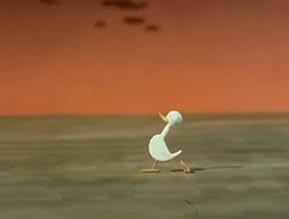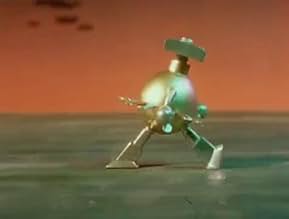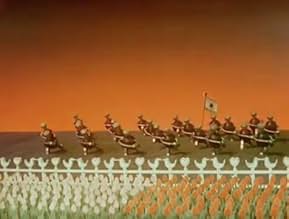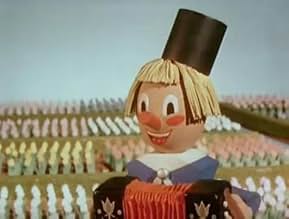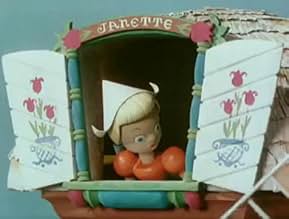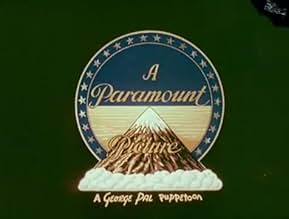Füge eine Handlung in deiner Sprache hinzuA carefree boy and a young girl find their idyllic countryside invaded by an army of mindlessly destructive robots.A carefree boy and a young girl find their idyllic countryside invaded by an army of mindlessly destructive robots.A carefree boy and a young girl find their idyllic countryside invaded by an army of mindlessly destructive robots.
- Regie
- Drehbuch
- Für 1 Oscar nominiert
- 1 Gewinn & 1 Nominierung insgesamt
Empfohlene Bewertungen
'Tulips Shall Grow (1942)' is a wartime 'Puppetoon' in which a young pair of lovers come under threat when an invading force of unfeeling machines starts to destroy their idyllic countryside home. The short starts out as a whimsical love story, its charming aesthetic enhancing its tried-and-tested romance. After a couple of minutes, though, it takes a hard left turn into all-out war. This sequence doesn't pull any punches; though no humans are shown to be harmed, the machines do absolutely devastate the environment and bomb every windmill in sight. The short is, in essence, an anti-war piece made in the midst of a very real war. It's not hard to see that the machines are an allegory for the Nazis and that the setting is meant to represent one of the European countries they invaded. The anti-war sentiment only really exists in the sense that we're shown how it decimates an innocent environment; it isn't any deeper than that. However, perhaps that's to be expected at a time when the war had to be won, rather than prevented. The picture is kind of unrealistic and, as such, it sort of trivialises the power of the opposing force. It's easy to see why it aims for overt optimism, though, and a message that ultimately says (as its title suggests) that peace and prosperity can in fact emerge from a war-torn world would've been incredibly pertinent at the time it was released. It's designed to tell the public that everything will be okay in the end. It's a little naïve in retrospect (after all, the filmmakers couldn't be sure the war would end in a favourable way), but it basically presents the right message at the right time if you view it in the context of its release. It's a solid effort. 6/10.
10llltdesq
This short, nominated for an Academy Award, was made by George Pal and concerns an invasion by mechanized war machines in a place obviously modeled on Holland, which was under occupation by the Nazis at the time. It is a tribute to the ability of humanity to persevere against the worst imaginable events and no only survive, but thrive. It is incorporated into The Puppetoon Movie and is a wonderful piece of work. The ending is glorious! Most highly recommended.
February 1st was Hungarian animator/film producer/director George Pal's birthday, so I decided to include his Oscar-nominated "Puppetoon" shorts as part of my Academy Awards marathon: he actually received 7 such nods, but I only managed to locate 4 of these films. This begins as a fairly ordinary romance between a young couple, albeit in an atypical and appealing Dutch setting, but soon adopts an allegorical stance to effectively present a standard WWII theme. In fact, the peaceful village is overrun by mechanical "Screwballs" (obviously standing in for the Nazis); despite the extensive damage done to the land, the tulip (the country's national flower) still grows and even forms a victory sign in defiance at the end!
Before George Pal became famous for his sci-fi films of the 50s (such as "War of the Worlds" and "When Worlds Collide"), he established himself as a stop-motion animator. Using very small budgets and a lot of patience, he made some charming little films using wooden dolls. "Tulips Shall Grow" is one of these--and it's also a propaganda piece meant to bolster the war effort.
The film begins in happy Holland. Happy people doing happy stuff amid the happy tulips. However, soon the 'Screwballs' (made of screws and balls, actually) invade--an obvious allusion to the Nazis. Thing look bad for the happy people, tulips and windmills. However, because the Screwballs are idiots, eventually they destroyed themselves and left this merry land to the locals. It features VERY splashy sets and dolls and it's quite cute--perhaps too much for some. But very well made and worth seeing. My only reservation has nothing to do with the original film but the condition of the print I saw. It was very orange and lacked the original color. It obviously was in color but not any more.
The film begins in happy Holland. Happy people doing happy stuff amid the happy tulips. However, soon the 'Screwballs' (made of screws and balls, actually) invade--an obvious allusion to the Nazis. Thing look bad for the happy people, tulips and windmills. However, because the Screwballs are idiots, eventually they destroyed themselves and left this merry land to the locals. It features VERY splashy sets and dolls and it's quite cute--perhaps too much for some. But very well made and worth seeing. My only reservation has nothing to do with the original film but the condition of the print I saw. It was very orange and lacked the original color. It obviously was in color but not any more.
A young boy and girl, dressed in costumes based on Dutch traditional clothes, find their idyllic, windmill-laden countryside is being over-run by unfeeling, unthinking mechanical men that lay waste to everything in their path.
Some have said this is a propaganda film, albeit a very good one. And that is true. But what is the message? Jan and Janette are not fighting the Screwballs, but merely just trying to live their happy lives. If the message is anything, it is that happiness is eternal, hardly something that would be considered a propaganda message.
I absolutely love the skill involved. I don't know if this is stop motion (though I assume it must be). Quite possibly this was the finest work of its kind in the 1940s.
Some have said this is a propaganda film, albeit a very good one. And that is true. But what is the message? Jan and Janette are not fighting the Screwballs, but merely just trying to live their happy lives. If the message is anything, it is that happiness is eternal, hardly something that would be considered a propaganda message.
I absolutely love the skill involved. I don't know if this is stop motion (though I assume it must be). Quite possibly this was the finest work of its kind in the 1940s.
Wusstest du schon
- WissenswertesIn 1997, the film was selected for preservation in the United States National Film Registry by the Library of Congress as being "culturally, historically, or aesthetically significant".
- PatzerWrong year in the wrong year.
- VerbindungenFeatured in The Fantasy Film Worlds of George Pal (1986)
Top-Auswahl
Melde dich zum Bewerten an und greife auf die Watchlist für personalisierte Empfehlungen zu.
Details
- Erscheinungsdatum
- Herkunftsland
- Sprache
- Auch bekannt als
- Madcap Models No. U1-5: Tulips Shall Grow
- Produktionsfirmen
- Weitere beteiligte Unternehmen bei IMDbPro anzeigen
- Laufzeit
- 7 Min.
- Seitenverhältnis
- 1.37 : 1
Zu dieser Seite beitragen
Bearbeitung vorschlagen oder fehlenden Inhalt hinzufügen

